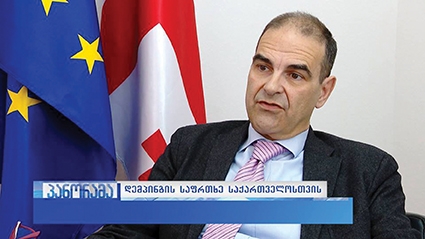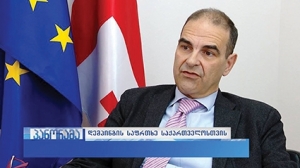WTO, EU on Dumping Know-How & Why Georgia Needs to Counter It
With visa liberalization at full steam ahead and skeptics left twiddling their collective thumbs waiting for the "horde of Georgian wannabe criminals" to approach European borders (not least dispirited by the PM’s announcement of a EUR 3000 fine upon return), there are still a great many things Georgia can do to turn its European aspirations into reality.
When asked what the next step in Georgia’s European integration might be, Tbilisi and Brussels both point to the Association/DCFTA Agreement and its successful implementation. For that, Georgia has to harmonize its legal codes to that of the EU, which is an arduous process in its own right. One of the sectors where Georgia falls short of European standards is the anti-dumping legislation privy to the EU’s internal market. And dumping has become an aggravating problem lately – three huge court cases are enough of a proof of that. What dumping is, why it is bad and how the state can counter it were the questions PANORAMA Talk Show and GEORGIA TODAY asked the EU Deputy Ambassador to Georgia, Mr. Carlo Natale.
How does the anti-dumping legislation work in the EU and how is price fixing avoided in the member states?
Dumping happens when a product is exported to the market below its normal price. The normal price is established on the basis of the cost of production, or costs applied to that product by the exporting domestic market. So, when this situation happens, companies, groups of companies or EU member countries may lodge a complaint with the Commission authorities, the Director-General of the European Commission for Trade, and an investigation is conducted to establish the normal price and analyze the commercial practices. If the investigation concludes that there was dumping, the Commission would propose to adopt specific import duties. These duties would affect certain exporting companies or countries. Companies that engage in dumping will become subject to special duties if they want to export to the EU market.
Also, it is important to consider that the WTO has established some principles and guidelines on “trade safeguards” which should be incorporated into national laws. This includes anti-dumping and counter-duties, and what the WTO says is that there are some principles which all legislations in all countries apply to avoid anti-dumping measures and prevent trade safeguards turning into a protectionist mechanism rather than a mechanism of protection from unfair trade practices.
Has the EU recommended Georgia adopt anti-dumping laws or is there any timeline for their adoption?
There is no timeline; but if it is passed, it must correspond to principles established by WTO rules. So, when Georgia started preparing an anti-dumping law in 2015, we were asked and we provided comments for the draft law, but this process of preparation is still ongoing.
What was the content of these comments?
I can only confirm that we are ready to provide expert advice to Georgia on legislation that is fully compliant with WTO rules. We have done it and we continue to be ready to help if needed as it may become necessary as Georgia develops its manufacturing industries in the future.
We dully followed Mr. Natale’s advice and contacted the World Trade Organization in Geneva, where the Director of External Relations Division, Mr. Keith Rockwell, was only too glad to provide us with a WTO perspective on dumping and anti-dumping measures.
"What does dumping mean? Generally speaking, what it means is that the goods are being sold in the market to which they are being imported, in a neighboring country, perhaps, at a price that is below what we call “normal value”. So you’re selling it at a discounted price compared to what you would at your home market, or perhaps you are even losing money on that product – you are not covering your costs, you are not generating any profit, but you’re still selling them. That is called dumping. Governments are permitted under WTO rules to counteract these kinds of practices by applying anti-dumping duties or a tax at the border which would offset this margin. But you have to follow the rules when you do this. And the rules are very straightforward: you have to determine, as I suggested before, whether the price of the product is below normal value. Then you have to show that by doing this, the exporting country is injuring the domestic industry. And if it can be proved that those dumped import goods are causing injury to the domestic market and that the cause of the injury to the sector is those imports’ below-normal prices, then the importing country can apply these duties. It’s a complex thing; it has to be done in a certain way; it has to be done in a transparent way, with the importing country notifying and saying “we’re now going through an investigation”; they have to share any evidence that they get and they have to go through the process whereby they don’t carry this on indefinitely. If the dumping process stops, then the anti-dumping duties should be withdrawn."
One of the aspects of dumping that confuses many is that they think – well, if somebody is selling goods at a cheaper price, that must be good! Could you explain why this is not the case?
When governments craft their trade policy, there is always a very careful balance they must strike between the interests of producers and the interests of consumers. You’re absolutely right in saying that consumers want goods to be as cheap as they can be, but if producers feel as though they have to go up against what they consider unfair competition, they consider it to be a practice that should not be permitted to take place. And so the governments need to make this calculation.
And then in comes the aspect of the so-called predatory pricing
That is what producers would say about this sort of thing. There have been cases where you might find a specific industry selling products below market value and in so doing, driving their competitors out of the domestic market.
Which is a crime, right?
Well, if you engage in the sale of products at prices below the normal value, it is something which could be actionable – that is to say, the importing government can respond with taxes. And the rules of WTO allow this, provided it is done in a way which is within the scope of the rules.
Another narrative is used to counter and deny dumping accusations, usually voiced by importers, is that such policies scare investors away. For a country that is so eager to attract foreign investment, isn’t this a kind of indirect bullying?
It very much depends on what’s actually going on. What I can say is that rules do allow addressing what is considered unfair practice through a “trade remedy”, to use our jargon.
Georgia, being a WTO member country, is obliged to have anti-dumping legislation and the gov’t is working on that. But what happens to those companies which have suffered substantial financial losses due to dumping meanwhile – are they eligible to demand compensation from the courts?
The way the rules are constructed, the WTO itself does not take action. It’s up to the individual member countries. If a country does take action against dumping practices, then that could be the subject of a dispute from another country. It would not be the WTO’s job to respond to the kind of scenario you outlined; it is up to the domestic government to decide on the manner in which it would respond. How the Georgian government would respond to something like this is for them to decide. And as I said, Georgia would not be unique in terms of having to craft a policy in response to injured industries, whether they have been injured by fair or unfair trading practices. They can respond; they can levy a tax at the border on those products coming in. The rules permit this. Now, in many instances we find, particularly with developing countries, that they have not been able to implement domestic legislation that would allow them to do this. Borrowing a line from you, I’d say that now in Tbilisi they are developing these kinds of laws to allow them to respond to what the Georgians believe to be unfair trading practices. Am I right?
Yes, and if I understood you correctly, until this domestic legislation on dumping is adopted – and there are domestic companies that have suffered from it – they should try and address the courts?
Frankly, it depends on what the legal system in Georgia says on this matter.
Vazha Tavberidze











